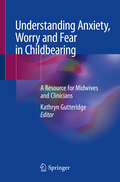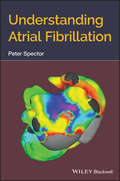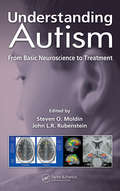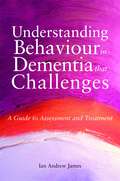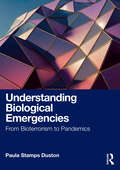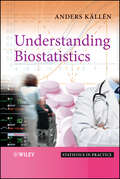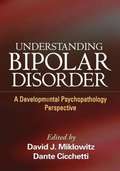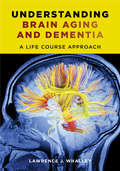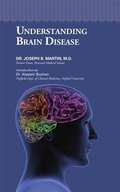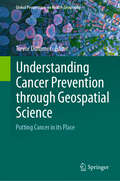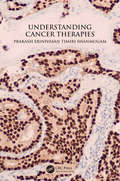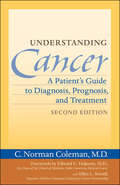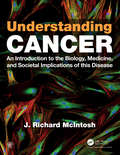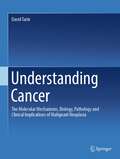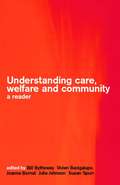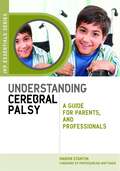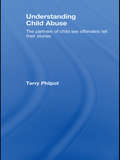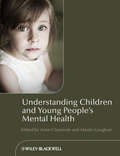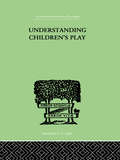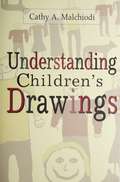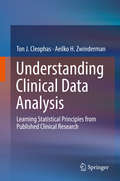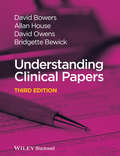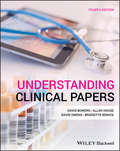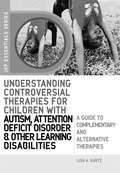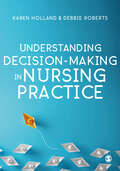- Table View
- List View
Understanding Anxiety, Worry and Fear in Childbearing: A Resource for Midwives and Clinicians
by Kathryn GutteridgeThis book informs and enlighten health professionals on how the recognition of fearing women can change their episode of care during childbearing. It gives practical advice on the way women present to services and the challenges that this invokes. This work is the first of its kind aimed at clinicians to deconstruct ideology around childbearing myths and its challenges. The authors review the evidence that exists and how modern maternity systems are responding to fear and shaping healthcare. Whilst some worry and anxiety is expected and indeed considered normal during childbearing, it has been suggested that this has now proliferated to a degree of abnormal for many women. Why is that and how is this panic spread? Media portrayal of birth is suggested as unrealistic material and to show only that which is dramatic and horrific. This has been considered as one factor influencing modern women. Medicalisation, technology and demand upon services is another consequence of providing almost all maternity care in hospitals. Given that the majority of childbearing women are fit and healthy is this another causative factor? By removing women from their homes and families at such a vulnerable time has a serious consequence for how she will experience her greatest leap of faith into motherhood. All of these issues are explored and examined in the book with ideas and practical suggestions of what may be done to change this increasingly common problem. This book is intended at midwives and clinicians working in maternity settings.
Understanding Atrial Fibrillation: A Conceptually Guided Approach
by Peter SpectorA new guide to the mechanisms and principles behind the world’s most common abnormal heart rhythm Affecting 30 million or more people across the globe, atrial fibrillation is one of the most prevalent – and yet misapprehended – issues facing modern cardiology. Its potential causes and optimal treatment strategies are matters of some conjecture in the medical community, where ongoing research has yielded findings that can prove challenging to those not familiar with the complex physiology at the root of the condition. Recognizing these concerns, distinguished electrophysiologist Peter Spector has designed Understanding Atrial Fibrillation as a means by which to equip clinicians with the data and analytic tools needed to develop a better grasp of this arrhythmia’s full nature. The book begins by providing a detailed explanation of atrial fibrillation’s causal mechanisms and builds its exploration from there. Working toward an up-to-date knowledge of the mapping and ablation of atrial fibrillation, its chapters assess the experimental data that has shaped current thoughts on the condition and then outline the best methods with which to interpret that rich but potentially difficult information. This revelatory new guide: Explores hypotheses of multiple drivers and mechanisms co-existing in individual patients Addresses common misperceptions and inaccurate views about atrial fibrillation Describes the basic physiology of atrial fibrillation’s propagation and reentry Explores the various mechanisms and higher-order dynamics of fibrillation Discusses how to intervene and alter atrial physiology to prevent fibrillation Understanding Atrial Fibrillation is truly an invaluable resource for physicians, fellows, residents, electrophysiology lab staff, and all other practitioners involved in the diagnosis and treatment of atrial fibrillation.
Understanding Autism: From Basic Neuroscience to Treatment
by Steven O. Moldin John L.R. RubensteinTaking an all-inclusive look at the subject, Understanding Autism: From Basic Neuroscience to Treatment reviews state-of-the-art research on the diagnosis, treatment, and prevention of autism. The book addresses potential mechanisms that may underlie the development of autism and the neural systems that are likely to be affected by these molecular,
Understanding Biological Emergencies: From Bioterrorism to Pandemics
by Paula Stamps DustonThis book investigates the links between the main sources of biological emergencies and presents a comprehensive policy framework that seeks to achieve the ultimate goal of biological security.The work offers a new interdisciplinary approach to analyse the linkages between the three main sources of biological emergencies: intentional attacks, natural zoonotic transmission, and lab accidents. In doing so, the text describes the history of using nature to create a weapon, focusing on dispersal methods. The most important Select Agents for monitoring are described, with a special focus on anthrax and smallpox. The case studies presented include the use of the Biological Weapons Convention (BWC) in Iraq and the 2001 anthrax attack in the US. The policies that created the emergency preparedness system are analysed, and the current system is described in terms of their effectiveness in responding to the COVID-19 pandemic. The book concludes with some ideas and specific suggestions for moving from response to risk reduction and prevention.This book will be of much interest to students of biosecurity studies, public health, public policy, political science and international relations, and to professionals working in the fields of public health, public safety, medicine, nursing, and first responders as well as military personnel.
Understanding Biostatistics
by Anders KällénUnderstanding Biostatistics looks at the fundamentals of biostatistics, using elementary statistics to explore the nature of statistical tests.This book is intended to complement first-year statistics and biostatistics textbooks. The main focus here is on ideas, rather than on methodological details. Basic concepts are illustrated with representations from history, followed by technical discussions on what different statistical methods really mean. Graphics are used extensively throughout the book in order to introduce mathematical formulae in an accessible way.Key features:Discusses confidence intervals and p-values in terms of confidence functions. Explains basic statistical methodology represented in terms of graphics rather than mathematical formulae, whilst highlighting the mathematical basis of biostatistics. Looks at problems of estimating parameters in statistical models and looks at the similarities between different models. Provides an extensive discussion on the position of statistics within the medical scientific process. Discusses distribution functions, including the Guassian distribution and its importance in biostatistics. This book will be useful for biostatisticians with little mathematical background as well as those who want to understand the connections in biostatistics and mathematical issues.
Understanding Bipolar Disorder
by David Miklowitz Dante CicchettiThis is the first book to systematically examine the development and course of bipolar disorder across the lifespan, identifying important directions for evidence-based treatment and prevention. The editors and contributors are foremost authorities who synthesize cutting-edge research at multiple levels of analysis, including genetic, neurobiological, cognitive, emotional, and family perspectives. Compelling topics include how bipolar symptoms change from childhood through adolescence and adulthood and the interplay of risk and protective factors at different developmental stages. The volume also addresses how developmental knowledge can inform the selection and timing of clinical interventions.
Understanding Brain Aging and Dementia: A Life Course Approach
by Lawrence WhalleyThe life course method compares an individual's long-life and late-life behaviors to gauge one's mental decay. Arguing the life course approach is the best and simplest model for tracking mental development, Lawrence J. Whalley unlocks the mysteries of brain functionality, illuminating the processes that affect the brain during aging, the causes behind these changes, and effective coping strategies. Whalley identifies the genetic factors that determine the pace of aging and the behaviors, starting in childhood, that influence how we age. Through vignettes, charts, and tables, he composes an accessible book for patients, family members, and caretakers struggling to make sense of a complex experience.
Understanding Brain Disease
by Joseph B. MartinUnderstanding Brain Diseaseis as much for the specialist as it is for the lay person interested in finding out where we are today in the scientific attempts to understand and control such conditions as stroke, Alzheimer’s, Parkinson’s, and BSE. The book will help build bridges between medical practitioners and researchers and the general public. One has only to take stock of Canadian statistics to realize the immense, and world-wide, significance of this research and the need for information -- Stroke is the fourth leading cause of death in Canada. Each year, about 16,000 Canadians die from stroke. Each year, more women than men die from stroke. There are between 40,000 and 50,000 strokes in Canada each year. For every 10,000 Canadian children under the age of 19, there are 6. 7 strokes. About 300,000 Canadians are living with the effects of stroke. After age 55, theriskof stroke doubles every 10 years. A stroke survivor has a 20% chance of having another stroke within 2 years. Of every 100 people who have a stroke 15 die (15%) 10 recover completely (10%) 25 recover with a minor impairment or disability (25%) 40 are left with a moderate to severe impairment (40%) 10 are so severely disabled they require long-term care (10%) Stroke costs the Canadian economy $2. 7 billion a year. The average acute care costs is about $27,500 per stroke. Canadians spend a total of 3 million days in hospital because of stroke. - Heart & Stroke Foundation of Canada Statistics
Understanding Cancer Prevention through Geospatial Science: Putting Cancer in its Place (Global Perspectives on Health Geography)
by Trevor DummerThe worldwide cancer burden will double over the next two decades, with the number of new cancer diagnoses increasing in all regions of the world. However, it is estimated that around 40% of all cancers are preventable through the appropriate application of existing epidemiological and public health knowledge, and with further research this proportion will increase considerably. This edited volume explores the role of place in cancer prevention and how geospatial tools can be used to support this globally important goal. Its chapters detail many aspects of the application of geospatial science to cancer control, including quantifying exposure to environmental carcinogens, access to screening services, the importance of partnership building, and more through a variety of geographically diverse case studies. The book also offers background on geospatial modeling tools and methods for adding spatial analysis to cancer surveillance systems. The book is rooted firmly in the notion that geography significantly influences the accumulation of cancer risks (at the individual and community level) that are modifiable through policy, regulatory, and behavioral changes. The landscape of cancer prevention is vast, encompassing the building blocks of population and public health—i.e., epidemiology and causation—through risk factor modifications, behavior and policy change, to the interface of the cellular with society, including epigenetic modifications and gene/environment interactions, cancer genomics and precision medicine/health. It is clear that geography (space, place, setting, context) is central to all these activities. Geospatial methods and data support risk factor identification, can elucidate the interaction between individual behavioral, demographic, and genetic factors with community level contextual factors, and can be used to prioritize interventions more accurately towards at-risk people and at-risk population groups. Geography is also central to the organization of health services and hence, by definition, is fundamental to the organization of preventative services. More broadly, adopting a geographical approach can help move cancer prevention beyond a narrow medical definition of health, to tackle the upstream and structural determinants of cancer.
Understanding Cancer Therapies
by Prakash Srinivasan Timiri ShanmugamThis book is an introduction to cancer treatment, the basics of radio- and chemotherapy, drug actions, the eradication of cancer cells, and the origins and persistence of pharmacological and toxicological effects of drugs. It further provides ideas for research based on knowledge of cancer metastasis, invasive and molecular pathways, and diagnosis and treatment. Many of the adaptive features of cancer biology, clinical features, pathology and treatment are reviewed. In addition to introducing the major themes and theories, the book also advances the current discussion by moving beyond explanations for clinical implementation. Key Selling Features: Reviews basic cancer treatments Summarizes chemotherapies Discusses radiotherapies Examines pharmacological and toxicological approaches to treatment Introduces oncological drug development
Understanding Cancer: A Patient's Guide to Diagnosis, Prognosis, and Treatment
by C. Norman ColemanThe greatest need of anyone with cancer is to understand the disease—its diagnosis, treatment options, and the often devastating experience of having cancer. In Understanding Cancer, Dr. C. Norman Coleman explains how to gather information about treatments and how to interpret that information to make decisions. He helps the person with cancer prepare for visits to doctors and the hospital and to make those visits as productive as possible. He distills the often complex medical terms and concepts underlying the statistics and percentages used to characterize medical conditions. With clear, in-depth discussions of pretreatment staging of disease, the biology of cancer, how successful treatment is defined, and how best to manage one's time, Understanding Cancer helps people with cancer and their families become active participants in the decision-making process.In the second edition of this highly respected guide, Dr. Coleman describes new treatments that target specific types of cancer as well as treatments that are designed for a particular individual. He discusses the era of molecular medicine, including biomarkers, novel imaging, molecular signatures and profiling, and molecular-targeted therapy. Many of these therapies are currently only available through a clinical trial, so Dr. Coleman includes a detailed discussion of what is involved in participating in research trials.Compassionate, accessible, and informative, Understanding Cancer will increase the reader's knowledge of medical concepts and terms so the person with cancer, the family, and the health care team can work together efficiently—and effectively.
Understanding Cancer: An Introduction to the Biology, Medicine, and Societal Implications of this Disease
by Richard Mcintosh/Mcd BiologyUnderstanding Cancer is a brand-new undergraduate textbook that uses simple language and well-chosen examples to explain the biological processes that underlie cancer and inform our methods for the diagnosis and treatment of this disease. The book has been carefully designed to provide key information relevant for students seeking a broad and accessible introduction to the cancer problem, even if they have no prior training in biology or chemistry.
Understanding Cancer: The Molecular Mechanisms, Biology, Pathology and Clinical Implications of Malignant Neoplasia
by David TarinThis book provides a unique, wide-ranging description of the phenomenon of cancer and its pathological effects in diverse species including humans, domesticated and wild animals, invertebrates, and plants. The broad scope of information presented is used to construct radical new insights into biological self-regulation and explain their relevance to its disruption by cancerous growth and spread within the human body.Mechanisms of action of carcinogenic agents, initiation, progression, metastasis, inappropriate gene expression, dormancy, latency, regression, and reasons for susceptibility and/or resistance to cancer are all considered. Also discussed are criteria for pathological diagnosis, advances in treatment, implications for public health, and pitfalls in diagnosis and interpretation of experimental results.The book describes operational mechanisms of cancer at the levels of whole individual, organ, tissue, cell, molecular, and even atomic (quantum) scales of structural and physiological order. Evidence is assembled from all these levels of organization to show that cancer is a dynamically changing disorder and that it is an inherent and perpetual risk of multicellular composition. This provides pragmatic new biological and clinical perspectives on malignant neoplasia. The biological insight is that it is a consequence of progressing miscommunication within a cellular society.The clinical perspective is realistic but optimistic in reasoning that, although cancer can never be completely eradicated from human life, because it is a disorder of our intrinsic biological constitution, it can be controlled and ameliorated and even cured in a proportion of individuals.The text is profusely illustrated with over 300 macroscopic and microscopic pictures. It will stimulate curiosity and interest specialists, as well as beginners, in many scientific disciplines and provides copious references to the medical and scientific literature supporting its conclusions.Readers from fields as diverse as medicine, pathology, veterinary sciences, cell biology, molecular biology, developmental biology, and epidemiology will find the information the book contains thought-provoking, interesting, and useful. Additionally, specialists in occupational and environmental health and legal experts focusing on exposure to carcinogenic materials and pollution will find the contents valuable and informative.
Understanding Care, Welfare and Community: A Reader
by Julia Johnson Vivien Bacigalupo Joanna Bornat Bill Bytheway Susan Spurr<p>Care, welfare and community are three key concepts in contemporary social policy. This reader covers a wide range of topics associated with them and relevant to the delivery of care and support to adults. It includes a wide-ranging collection of articles by leading writers and researchers, some previously published, some newly commissioned. It also has first-hand accounts by users and providers of care and welfare in the community. Groups covered include people with mental health problems, homeless people, older people, people with learning difficulties and people with impairments. The focus throughout is on how policies and practice can be developed appropriately and sensitively through an understanding of current issues. <p>The 40 chapters are grouped into four sections, each with an introduction. Five of the chapters are made up of extracts from a wide range of documents and testimonies. <p> <li>Power and inequality <li>Difference and identity <li>Rights and risk <li>Territories and boundaries <p> <p>Most of the material relates to a diverse turn-of-the-century Britain, but this is set in a wider context enabling the student to explore the alternative realities of other countries and other times. <p><i>Understanding Care, Welfare and Community</i> provides an integrated, multidisciplinary overview of the many different aspects of community care. It is appropriate for students and professionals following a wide range of courses in social work, nursing, care, health, social policy, medicine, voluntary work and welfare services. It will also be a valuable resource for carers and practitioners, teachers and policy makers.</p>
Understanding Cerebral Palsy
by Marion StantonAn invaluable starting point for anyone encountering cerebral palsy for the first time, this book provides essential background information on causes, types and symptoms, as well as vital advice about the treatments, therapies and sources of support available. Practical tips on everyday considerations such as communication, diet and education will help parents achieve the best quality of life for their child. A final chapter explores options after compulsory education and how best to support a young person making the transition to independent adulthood. Using personal experience and case studies as sources of inspiration, as well as a comprehensive list of resources to signpost readers to further information, this positive handbook will help parents and professionals more fully understand cerebral palsy and the different options available to people with the condition.
Understanding Child Abuse: The Partners of Child Sex Offenders Tell Their Stories
by Terry PhilpotUnderstanding Child Abuse is the first book to look at women whose partners are child sex offenders. Much of the book is devoted to the voices of the women themselves, telling their stories and how they feel about the situations in which they found themselves, how they coped, and how they remade their lives and those of their families. They describe what they learned from their experience and how it changed them. Such experience is largely overlooked by researchers, agencies and policy makers and this book throws unique light on this neglected area. The chapters cover: What we know about child sexual abuse, offenders and the effect of sexual abuse on children. A detailed description of the work which allows the women to explore and compare their experiences and feelings about what has happened. Verbatim interviews with both partners and offenders. Combining theory, practice and personal testimony in a concise and accessible manner, Understanding Child Abuse is essential reading for social work practitioners and students as well as probation officers and anyone involved with child protection. It will also be of interest to members of the public.
Understanding Children and Young People's Mental Health
by Martin Gaughan Anne ClaveiroleUnderstanding Children and Young People's Mental Health has been designed to help the student and newly qualified health care professional to familiarise themselves with the key theoretical frameworks underpinning the field of children and young people's mental health. It explores the mental health challenges that children and young people face, and how we as adults can work alongside them to help them face and overcome such challenges.This book provides comprehensive information on the theory and practice of particular mental health difficulties which children and young people may have to face, including self-harm, depression, suicide, child abuse, eating disorders, substance misuse, and early onset psychosis. Understanding Children and Young People's Mental Health is essential reading for pre-registration students in nursing and healthcare on child and mental health branches, and for newly qualified nursing, health and social care practitioners who work with children and young people.Brings together specialist practitioners and academics in the fieldIncorporates the latest guidelines and policiesPractical and accessible in style with learning outcomes, activities, examples and recommended reading in each chapter
Understanding Children'S Play
by Ruth E. Hartley Lawrence K. Frank Robert GoldensonFirst Published in 1999. Routledge is an imprint of Taylor & Francis, an informa company.
Understanding Children's Drawings
by Cathy A. MalchiodiThis practical resource demonstrates how all clinicians can broaden and enhance their work with children by integrating drawing into therapy. The book enables therapists to address the multidimensional aspects of children's art without resorting to simplistic explanations. Approaching drawing as a springboard for communication and change, Malchiodi offers a wealth of guidelines for understanding the intricate messages embedded in children's drawings and in the art-making process itself. Topics covered include how to assist children in making art, what questions to ask and when, and how to motivate children who are initially resistant to drawing. Assimilating extensive research and clinical experience, the book includes over 100 examples of children's work.
Understanding Clinical Data Analysis
by Aeilko H. Zwinderman Ton J. CleophasThis textbook consists of ten chapters, and is a must-read to all medical and health professionals, who already have basic knowledge of how to analyze their clinical data, but still, wonder, after having done so, why procedures were performed the way they were. The book is also a must-read to those who tend to submerge in the flood of novel statistical methodologies, as communicated in current clinical reports, and scientific meetings. In the past few years, the HOW-SO of current statistical tests has been made much more simple than it was in the past, thanks to the abundance of statistical software programs of an excellent quality. However, the WHY-SO may have been somewhat under-emphasized. For example, why do statistical tests constantly use unfamiliar terms, like probability distributions, hypothesis testing, randomness, normality, scientific rigor, and why are Gaussian curves so hard, and do they make non-mathematicians getting lost all the time? The book will cover the WHY-SOs.
Understanding Clinical Papers
by David Owens David Bowers Allan House Bridgette BewickUnderstanding Clinical Papers is a popular and well established introduction to reading clinical papers. It unravels the process of evidence-based practice, using real papers to illustrate how to understand and evaluate published research, and provides clear explanations of important research-related topics.
Understanding Clinical Papers
by David Owens David Bowers Allan House Bridgette BewickUnderstanding Clinical Papers is a popular and well established introduction to reading clinical papers. It unravels the process of evidence-based practice, using real papers to illustrate how to understand and evaluate published research, and it goes on to provide explanations of important research-related topics.
Understanding Controversial Therapies for Children with Autism, Attention Deficit Disorder, and Other Learning Disabilities: A Guide to Complementary and Alternative Medicine
by Lisa A. KurtzOffering a balanced overview of complementary and alternative therapies, this book will be useful for parents of children with autism, ADD or other learning disabilities. The book covers a wide variety of mind-body interventions and manipulative techniques, as well as energy therapies, biologically based methods, and alternative medical systems. For each approach, the author provides a detailed description of what the treatment involves, which professionals will be working with the child, and an explanation of the rationale behind the therapy. She also offers advice on who to approach for treatment, and includes a list of recommended resources and useful contacts for further information. This book will be a valuable source of information for parents and professionals working with children who have disabilities that impact their learning or behavior.
Understanding Decision-Making in Nursing Practice
by Karen Holland Debbie RobertsA clear, accessible and evidence-based introduction to effective decision-making in nursing. It discusses the processes and frameworks that support clinical reasoning and applies theory and knowledge to the nursing context. Activities and case studies provide regular opportunities to apply theory to practice with real-world examples of decision making in action encourage students to reflect on and draw from their own lived experiences. The book has been carefully developed to support students in meeting the NMC Future Nurse Standards of Proficiency and draws from many of the lessons learned during the Covid-19 pandemic, making it a rich learning resource for all student and qualified nurses.
